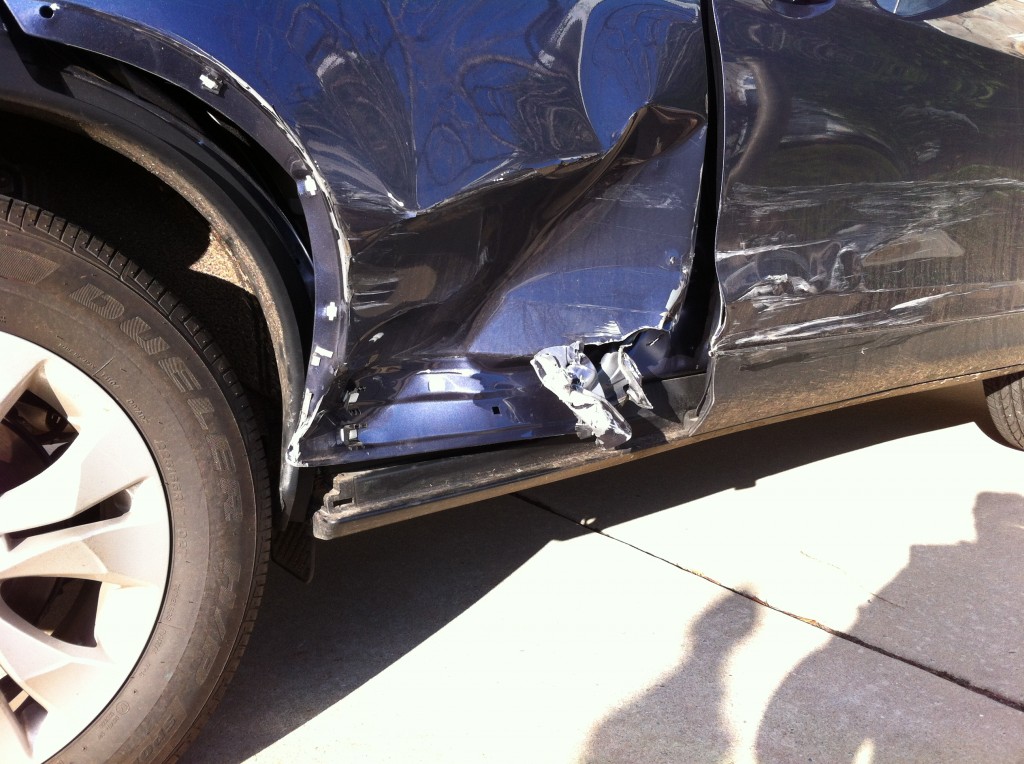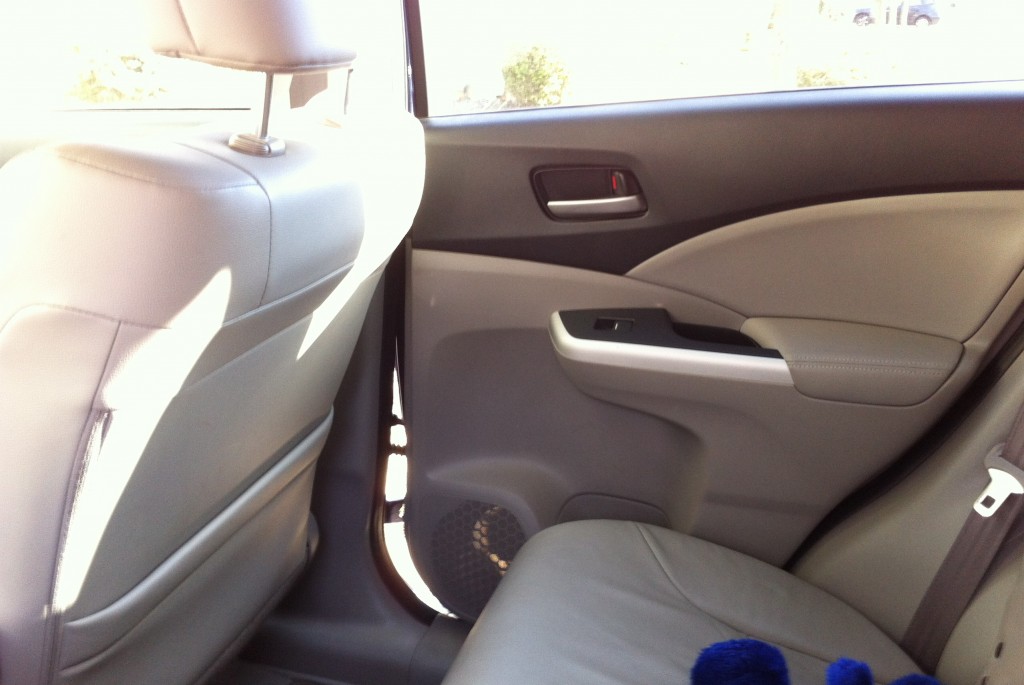First off, let me say this: No one was hurt. Regular readers know that I don’t generally write about local car accidents — unless there is an appellate decision or something legally noteworthy about them. But this was an accident that my family was in.
It was the Wednesday before Thanksgiving, and I was in the front passenger seat with Mrs. NYPILB behind the wheel. We made a right at a light from one main road to another. And out of a parking area on our right came an SUV trying to cross the road. Presumably to get to the other side.
Except that we were passing in front of him; and he t-boned us. Right into the passenger side, with the brunt of the force on the back door where my son was sitting, engrossed in a book.
There are several things that might race through the brain at this point, of which these are three:
1. The Parent (Are my kids OK, and how do we make sure there is no further potential for accident or injury?)
2. The Lawyer (The other driver failed to yield the right of way)
3. The bureaucrat (Closely linked to the lawyer, this one seeks documentation to make sure that the “i”s are dotted and the “t”s crossed with respect to insurance companies.)
Now this is not the first time I’ve written about an accident that I was in. It happened five years ago when a car with no lights and no license plates stopped in the middle of the parkway at night. I was driving and I stopped in time. One of the cars behind me did not.
And you know what? I’m no better prepared today for being in an accident than I was back then; because accidents are unexpected. If we expected them, well, we have a better chance of avoiding them.
Because they are unexpected, we often don’t really know, at the time of the impact, the answers to the questions that may one day flow if someone was really injured and an investigation or lawsuit ensued.
How fast were you going?
What lane where you in? (How many lanes were there?)
Where did you look in the seconds before the accident?
Where, exactly, were you?
While that last question might seem a bit silly, it really isn’t, most especially if it is a highway that you have driven hundreds of times. Your brain might well be on auto-pilot and while you know generally where you are, the exact location isn’t something that you were keyed in to. You might know, for example, that you needed exit 56, and that you were somewhere around exit 30, give or take. You don’t know exactly, because it isn’t particularly relevant.
The reality is that most of our “recollection” of an accident is our brain reconstructing what has happened as we spin our heads around and say WTF? And when we reconstruct things, we tend to fill in the blanks. This is a mental process that I like to refer to has “normal human behavior.” The psychs like to call it reconstructed memory, and will tell you that the brain abhors a vacuum so it provides the filler it believes to be logical.
But it’s odd when your own brain may be doing the the reconstructing, not someone else’s.
This fill-in-the-blanks view of an accident will generally lead to conflicting accounts of an event. People see things through the prism of their own experiences, both past and present and upon review of the event that just took place, and fill in the missing blanks. We may now see mileposts and exit markers, when before we were just driving merrily along knowing that we were roughly 15 minutes from our exit and keeping an eye on the car in front of us. We see intersections and people (aka witnesses) that we hadn’t really noticed or appreciated before. Because the accident, almost by definition, happened very fast and we had no time to react.
And, of course, the adrenal gland has decided that this would be a magnificent time to give the body a good old shot of hormone that sends the heart and mind racing.
After an accident, nothing is normal at all. But that moment when the mind and body are reeling is the moment the brain is imprinted with the “details” of recollection. Since those recollections are experienced through the prisms of our own histories, the lawyer might well “see” something different in an accident than the doctor, mechanic or cop.
All of this is something that the reader likely already knows, on an intellectual level. And yet, when one actually goes through the event, it doesn’t really matter. The god’s eye view of what happened — that fly on the wall view of things — may well be distorted by emotion, by experience and by reconstruction.
I wrote this post six weeks ago and have been sitting on it ever since, hoping I could come up with some kind of snappy conclusion or insight. But I can’t, other than to say that the most important thing is immediate safety. For us, sitting in the roadway after the accident near a busy intersection, that mean moving the car immediately out of danger into the parking area where the offending SUV came from.
I remember my father telling me, when I was learning to drive some 35 years ago, that if I got a flat tire on a bridge that I should not stop. Drive it off the bridge, and to hell with any additional damage to the car. It is, after all, just a car.
Safety first.


No question one of the worst fears of a parent is getting the phone call that your teenager has been in a car accident. I will not say its is worse if you handle such cases, but you do know many of the problems that will be faced up front, and that some things can’t be fixed. I have found myself in similar circumstances as three of my five children have had accidents. Great article – I think it captures what is going on in a parent and personal injury lawyers mind when they get a call.
Just reading this makes it seem like so many people would need a personal injury attorney. There are so many different types of accidents each day, and I guess because of all of that, lawyers have risen up to answer the call. Thanks for posting. I feel a little more enlightened about the world. I don’t experience everything here in Dallas, but I can try.
This raises an entirely different question for me: Since car accidents are an utterly commonplace occurrence and insurance companies are skilled at deciding whose policy will pay, why litigate? What is gained by an expensive fact-finding process in court — a very poor substitute for God’s eye — when claims could be paid according to a simple metric or on a no-fault basis?
Since car accidents are an utterly commonplace occurrence and insurance companies are skilled at deciding whose policy will pay, why litigate?
Our was a slam dunk matter and there was no litigation.
There are some insurance companies though, that will litigate everything to death under the theory that, if you make life miserable for the injured people, fewer people will bring claims. So they might have to suck up legal fees in some of the cases, but they think they come out ahead overall.